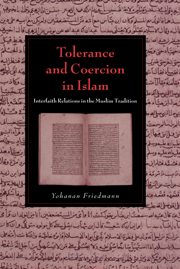Book contents
- Frontmatter
- Contents
- Preface
- Introduction
- 1 Religious diversity and hierarchy of religions
- 2 Classification of unbelievers
- 3 Is there no compulsion in religion?
- 4 Apostasy
- 5 Interfaith marriages
- 6 Concluding observations
- Selected Bibliography
- General Index
- Index of Qurʾānic verses
- Index of prophetic traditions
2 - Classification of unbelievers
Published online by Cambridge University Press: 10 August 2009
- Frontmatter
- Contents
- Preface
- Introduction
- 1 Religious diversity and hierarchy of religions
- 2 Classification of unbelievers
- 3 Is there no compulsion in religion?
- 4 Apostasy
- 5 Interfaith marriages
- 6 Concluding observations
- Selected Bibliography
- General Index
- Index of Qurʾānic verses
- Index of prophetic traditions
Summary
The religious history of mankind and its religious diversity has been a central theme in Muslim tradition since the earliest stages of its development. A copious literary genre, known in Arabic as al-milal wa al-niḥal, came into existence and included detailed treatment of Jewish, Christian and Muslim sects, as well as extensive descriptions of the religions and philosophies of Iran, India and Greece. The present book is not concerned with this relatively late literary genre, but rather with the same topic as treated in Qurʾānic exegesis, ḥadīth and jurisprudence. Here the issue of religions other than Islam is treated on a much more limited scope and is restricted to the religious traditions encountered by the Muslims in the nascent stage of their history: polytheism, Judaism, Christianity, Zoroastrianism and some of their offshoots.
The non-Muslim religious communities mentioned in the Qurʾān are the Banū Isrāʾīl and the Jews (yahūd), the Christians (naṣārā), the Zoroastrians (majūs), the Ṣābiʾa, and the polytheists who associate other deities with Allah (mushrikūn). As far as revealed books are concerned, we hear, in addition to the Tawrāt and the Injīl, about the “scrolls of Abraham and Moses” (ṣuḥuf Ibrāhīm wa Mūsā), the “first scrolls” (al-ṣuḥuf al-ūlā), “the books of the ancient people” (zubur al-awwalīn), the zabūr of David, commonly identified with the Psalms, and – outside the Qurʾān – “the scrolls of Shīth.” In extra-Qurʾānic literature, there are also the “heretics” (zanādiqa, sg. zindīq), frequently equated with the Manichaeans, and the Samaritans.
- Type
- Chapter
- Information
- Tolerance and Coercion in IslamInterfaith Relations in the Muslim Tradition, pp. 54 - 86Publisher: Cambridge University PressPrint publication year: 2003

